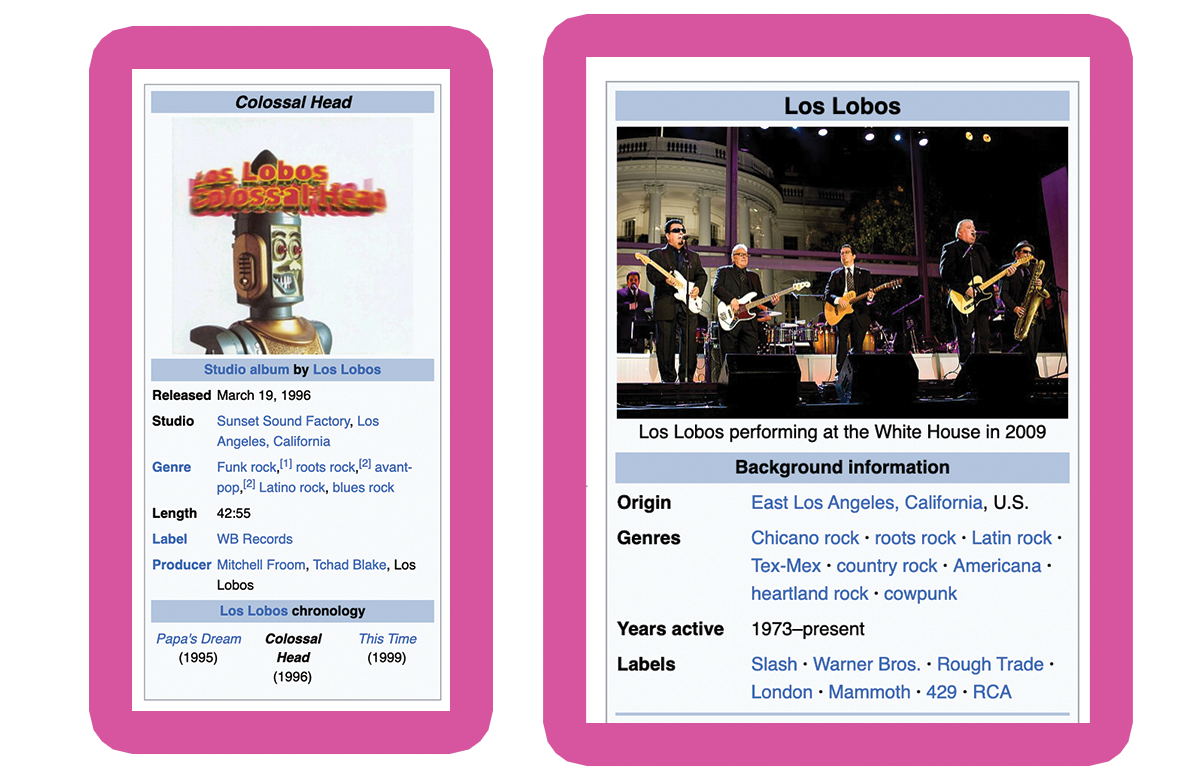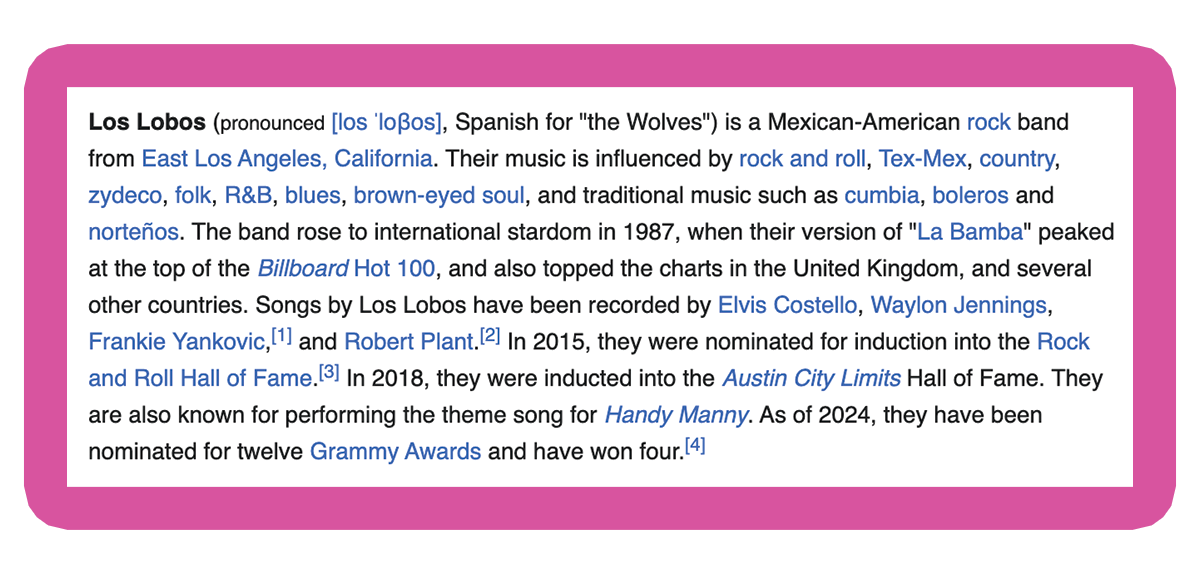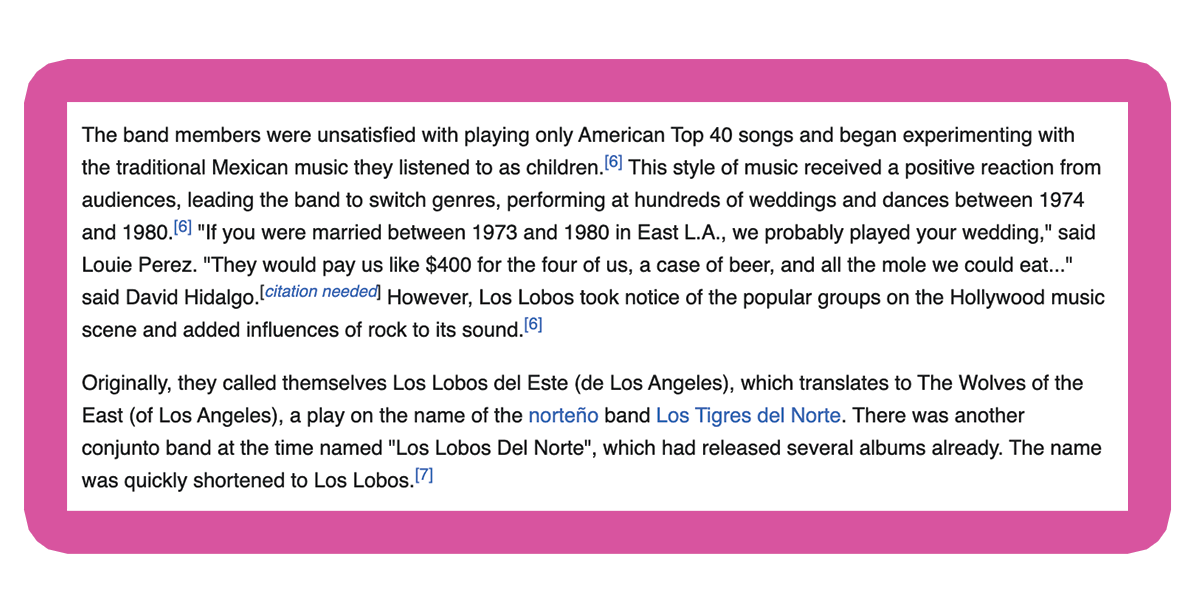
wikipedia surfing: Los Lobos, 'Colossal Head'
How to find new-to-you music? Let Mr. Spotify decide for you? Read the Pitched Fork? Ask your mom what she's vibing on these days? Give up and let autoplay take the wheel?
How about trying something different...and exciting...that uses the power of the internet and the volatile magic of Randomness?
I am super excited to publish three guest posts this week in a sort of very-special-episode I Enjoy Music miniseries format. Today, Wednesday and Friday, I'm publishing blogs from Harmony Woods that are all about using the Wikipedia "random article" generator to explore new music. That's right, popping "Special:Random" in the Wikipedia search bar and clicking until something musical arrives.
This discovery tactic is super fun, I just tried it out and the first music page I landed on was Jon Davison, former bassist of '90s Seattle psych-rock band Sky Cries Mary (a band that also boasts Is This It producer Gordon Raphael as an alum), and current vocalist for the band Yes. And this is how I find out that that the former bassist of '90s Seattle psych-rock band Sky Cries Mary is the current vocalist for the band Yes. Knowledge is beautiful. Wikipedia rocks.
Anyway, I won't dally further: take it away Harmony!!!

The central idea of this miniseries is to explore the world of music by repeatedly hitting random article on Wikipedia until something music related (whether that be an artist, a genre, a song, an album, a producer..) comes up. I’ve done this (and similar practices like looking up random names or words that come to mind) for years, and it always ends up taking me to interesting places.
Some of the music I’ve discovered through this path has ended up becoming my favorites, and honestly I don’t think it’s ever led to something I regret consuming. Almost without fail, the result is at the very least interesting and eye-opening. I think this practice has led me to listen to music I never would have been otherwise exposed to. I strongly believe that almost all music is good and even if I don’t personally like a piece of music I usually end up feeling like I am glad I listened to it. There is almost always at least some idea or some part of the experience that sticks with me and means I come out of it happy.
For this column, I decided to do this practice. The first random article landed on Colossal Head, a 1996 album by the Mexican-American rock band Los Lobos.


This album sounds very bluesy, very Latin, and generally very complex. This type of music is mostly unknown to me and certainly well outside of my typical circles. I really enjoyed it—the depth and complexity of this album really struck a chord. It says something that my first thought after listening to the album as I was thinking about it was “I should come back and listen to this again right now.”
The percussion section in particular was really interesting to me and I loved the various timbres. At times, it felt like every few seconds something new and interesting was coming in and catching my attention. It was difficult to not give my full attention to every little detail, and even on a second go-around it felt like I was hearing new depth and new parts that I hadn’t heard before. For instance, the little synth slide around 1:33 in the background of the opener "Revolution" is perhaps my favorite moment of the album and I only noticed it on a second listen.
My main gripe with the album I had while listening was that the first two tracks both ended with a fadeout. I think fadeouts are very reasonable things to use and a nice tool at times but two in a row felt, not quite lazy, but it felt like a lack of ideas. After listening to the album more, I actually came around on this. The album felt like it was a bunch of friends getting together and making music and you just happen to be a fly on the wall getting to hear these people come together and work together to make beautiful and interesting and fascinating sounds. In that context, a fadeout is perhaps the best way a song can end.

One positive I really enjoyed from the album is that on a lot of the songs it felt like the instruments and the vocals were really working together. The voices felt like they were in conversation in a really neat, cool, and enjoyable way. On a different note, there were many instrumental breaks that felt very natural and worthwhile. Often such breaks are a hard sell for me as vocals are quite important for me but here it fit the vibe and the goal that was trying to be reached.
A lot of the lyrics on the album were in Spanish, and some songs like "Mas Y Mas" were in a mix of Spanish and English. I feel like if I knew Spanish I might get even more out of this album and I’m probably missing some of the experience due to that. For instance, I feel like the song "Maricela," while still being a very enjoyable track, would be a lot more interesting If I could understand the meaning of the song’s lyrics. Incidentally, I don’t know if this is just me but the beginning of Maricela almost sound Christmasy to anyone else? I have no idea where it’s coming from—definitely not complaining though!

If you’re interested in checking this album out, I would definitely recommend either the closer "Buddy Ebsen Loves The Night Time" if you want a more chilled experience or "Mas Y Mas" if you would prefer a more energetic and high-tempo experience.
Harmony Woods (she/her) is a transgender mathematics graduate student currently living in Arizona. She adores listening to pop punk and emo music, among a wide array of other musical interests. Her favorite artists are rock group Waterparks and electronic music artist nanobii. When she’s not focusing on coursework, you can usually find her playing Magic the Gathering or playing around with data.
Thanks for reading I Enjoy Music! If you like it, tell a friend.

